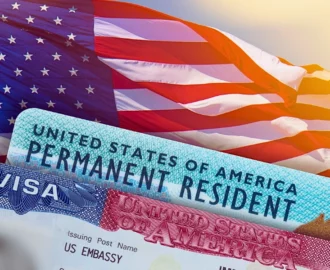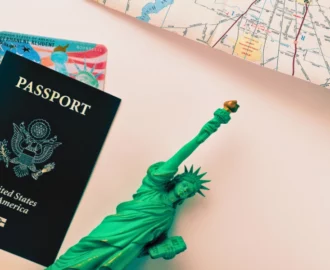How long does asylum last in America? Once a person attains asylum status in the U.S., this status is permanent in most cases unless U.S. Citizenship and Immigration Services (USCIS) has reason to revoke it. It’s rare that the U.S. government will terminate immigrants’ asylum status, which grants individuals benefits of staying in the country if they face persecution in their home countries.

If you would like help with filing for asylum or another immigrant or nonimmigrant status in the U.S., Cho Immigration Law is here for you. Call our Chicago immigration attorneys today at 312-853-3088.
How Does Asylum Work?
If an immigrant is currently in the U.S. and fears persecution in his or her country of origin, he or she may qualify for asylum status. A person with asylum status can live and work in the U.S. while avoiding the harm risked back home. Every year, the U.S. approves tens of thousands of asylum applications, with one recent year observing the protection of 54,350 asylees.
One of the main benefits of applying for asylum is the ability to become a lawful permanent resident (LPR) and begin the path to citizenship through naturalization. Specifically, after a year with asylum status, you may qualify for LPR status, and after four more years, you may seek citizenship.
There are few circumstances when USCIS may terminate a person’s asylum status, enabling most individuals to keep this status permanently until they decide to apply for LPR and citizen status.
What Factors Can Impact the Duration of Your Asylum?
So, how long does political asylum last? The answer to this will depend on the case.
The following are some of the reasons immigration applications are denied when seeking asylum:
Ineligibility
To qualify for asylum status, you must meet the requirements before and after applying for this status. Specifically, you must:
- Be at least 18 years old
- Currently be in the country or at a valid port of entry
- Have faced or experienced persecution or fear future persecution
- Face persecution for protected characteristics, such as your race, nationality, political beliefs, religion, gender, or membership in a specific social group
- Not have provided assistance to known terrorists
- Not have a criminal background consisting of serious crimes, such as murder
Inconsistent or Incomplete Information on Applications
USCIS officials will review all applications and supporting documents to check for valid and consistent details about the asylum seeker. Specifically, you will need to complete Form I-589, Application for Asylum and for Withholding of Removal.
Additionally, you will need different types of supporting documentation, including birth certificates, passports, police reports, medical records, and marriage certificates. The USCIS website will list all evidence to include, or an attorney could help you collect and organize all relevant documents.
Make sure all information is complete and up to date across all documentation, which will keep the process smoother.
A Lack of Preparation for the Interview
After submitting an application for asylum, you will need to attend an interview with a USCIS official.
To ensure you successfully complete the interview and move on with your application, you will need to prepare for the interview beforehand.
USCIS will notify you of a specific date and time for your interview. You must attend the scheduled interview on time at a designated facility. Throughout the interview, you will also need to prove that you qualify for asylum and confirm the information on your application and supporting documents.
If you need help preparing for your interview, this is also where an immigration attorney may be able to help. He or she can review all documentation and rehearse some questions that the interviewing officer is likely to ask. He or she could also be present during the interview, along with any witnesses who might support your answers.
Failing to Apply on Time
Upon entering the U.S. or a port of entry, immigrants typically have one year to apply for asylum. However, there are some special circumstances when this may not be possible.
For example, you may have longer than a year to apply if you were under the age of 18 at the time of entry. Circumstances may have also changed since you entered, rendering your return to your home country unsafe when it was safe upon entry. Some individuals could also suffer from certain disabilities that prevent them from applying for asylum within a year.
What Is the Renewal Process and Timeline?
You might also wonder, “How long is the asylum process, and how do I renew?” Renewing asylum is typically unnecessary, as this status is permanent.
However, you may need to reapply for a work permit to continue working in the U.S. You can do so online through the USCIS website by filing Form I-765. You will need to pay fees to renew your work permit, with mail applications costing $520 and online applications coming with a fee of $470. If you cannot pay the fee at the time of applying, you may request a fee waiver.
If you’re new to seeking asylum, the process of applying will vary from case to case, but it can take up to around four years to complete.
Different factors will influence the length of time it takes to go through the entire asylum process.
Are There Delays in Processing Asylum Applications?
There are some delays that can make the asylum process take longer than it originally would.
For example, there are times when backlogs can slow the process as immigration officials struggle to review all applications, especially when many are attempting to apply for asylum at the same time from one or multiple countries where they face persecution.
In addition, another potential delaying factor is poor communication between parties, such as poor coordination between immigration agencies when handling a case.
Meanwhile, some circumstances could cause applicants or officials to reschedule hearings or interviews.
Ultimately, all of these factors could contribute to long delays that cause the entire process to take years. Being prepared with the help of an attorney could help simplify and expedite the process.
Why Hire an Immigration Lawyer for Help in Chicago?
If you want to get through the asylum process with minimal issues, it’s often best to have an experienced asylum immigration lawyer in Chicago by your side.
There are several key ways an attorney could help you with seeking asylum, such as:
Preparing Documents
One of the main ways an attorney can assist you is by preparing all necessary documentation when applying for asylum. Your lawyer could help you complete and file Form I-589 and organize all supporting evidence, including birth certificates and other critical documents.
In the process, your attorney will also be able to help ensure all information is accurate and current to avoid discrepancies that might otherwise hurt your application.
Getting Ready for Interviews
An experienced and knowledgeable lawyer could also help you adequately prepare for your interview with an immigration official. He or she may go over some of the questions that officials often ask and ensure you give the right answer, keeping the details of your documentation aligned with your answer.
If needed, you can also have your attorney attend the interview with you to help guide you in the event of any issues, such as language barriers that might make some questions confusing or unclear.
Appealing Denials
If asylum is denied after applying, your attorney could also appeal the denial if you still qualify for asylum. He or she would know how to approach the appeal and take your case to the appropriate court, potentially reasoning why the court should reverse the decision, whether due to error on the part of officials or another valid argument.
Handling Other Types of Cases
Going beyond asylum, you might ask, “What types of immigration cases do lawyers handle outside of asylum?” Depending on the attorney, there are many cases that he or she could help you handle involving immigration or non-immigration matters.
For instance, your lawyer may be able to defend you if you face removal or deportation, working to provide the court with reasons why you still qualify to remain in the country. He or she may also help with sponsoring other family members to come to the U.S., apply for work permits, or complete the application process for various visa types.
Lawyers with sufficient experience will know the ins and outs of immigration law, applying that knowledge to your case to help you achieve a favorable outcome through reliable representation.
Need help with a potential asylum application or another case? The Chicago immigration attorneys at Cho Immigration Law are here for you. Contact us today to speak with an attorney to discuss your needs and learn what we can do for you.




